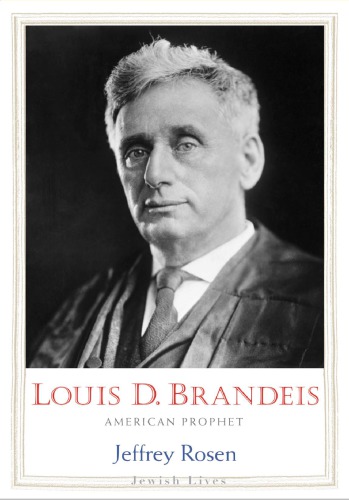
Louis D. Brandeis
American Prophet
کتاب های مرتبط
- اطلاعات
- نقد و بررسی
- دیدگاه کاربران
نقد و بررسی

April 1, 2016
In the latest installment of the publisher's Jewish Lives series, a legal scholar examines the career of Louis D. Brandeis (1856-1941), "the most important American critic of what he called 'the curse of bigness' in government and business since Thomas Jefferson." National Constitution Center president and CEO Rosen (The Supreme Court: The Personalities and Rivalries that Defined America, 2007, etc.) states unambiguously that he is not attempting to offer a comprehensive biography, citing three high-quality, full-life biographies published after Brandeis left the Supreme Court in 1939. Rather, he presents "a condensed study of his thought and character." Throughout the book, Rosen considers Brandeis as a philosopher and prophet; many of his teachings transcended the opinions related to specific cases decided by the Supreme Court. As the first Jewish Supreme Court justice, Brandeis surely based some of his ideas on his religious upbringing. To the extent that the author focuses on Brandeis' Jewishness, the conversation veers toward Zionism, as Brandeis tirelessly advocated for a newly created Jewish homeland in Palestine that might protect followers of the faith from anti-Semitism. More than Jewish influences, though, Rosen considers Brandeis as a student of Thomas Jefferson's writings and speeches, even suggesting Brandeis be remembered as the Jewish Jefferson. The commonalities between Jefferson and Brandeis coalesce around skepticism about the value of economic monopolies and bankers as well as the oft-ignored value of small farmers and other entrepreneurs. Like Jefferson, Brandeis vigorously supported the system of a federal government, each of the states sharing authority wisely, with each state as an autonomous laboratory of democracy. Within each of those states, Brandeis, like Jefferson, hoped optimistically that every citizen would become well-informed through lifelong self-education. In an epilogue titled "What Would Brandeis Do?" Rosen traces the justice's influence today, specifically on three contemporary Supreme Court justices: Ruth Bader Ginsburg, Elena Kagan, and Stephen Breyer. A tightly written, tightly reasoned biography aimed at readers who are not legal scholars.
COPYRIGHT(2016) Kirkus Reviews, ALL RIGHTS RESERVED.

May 15, 2016
Rosen (president & CEO, National Constitution Ctr.; law, George Washington Univ. Sch. of Law; The Most Democratic Branch) makes a noteworthy contribution to this series. His compact yet insightful book frames Supreme Court Justice Louis Brandeis (1856-1941) as an "American Prophet," as proclaimed in the subtitle. While the biography explores and explicates a number of Brandeis's major judicial opinions such as Erie v. Tompkins, it creates an expansive view of Brandeis's life in its totality. Thus, Brandeis was much more than a distinguished jurist; he was a prophet and philosopher in the Jeffersonian democratic tradition. As articulated in the first chapter, "The Curse of Bigness," Brandeis abhorred mammoth corporations and financial institutions. Indeed, he wrote the volume, Other People's Money, in which he argues for antitrust regulation. Moreover, Brandeis embraced Zionism and became active in the movement to create "the perfect citizen in the perfect state" of Palestine. Finally, his opinions profoundly influenced his successors, such as Justice Ruth Bader Ginsburg and Justice Elena Kagan. VERDICT Perfect for readers who desire a concise biography to supplement Melvin I. Urofsky's Louis D. Brandeis: A Life.--Lynne Maxwell, West Virginia Univ. Coll. of Law Lib., Morgantown
Copyright 2016 Library Journal, LLC Used with permission.

























دیدگاه کاربران